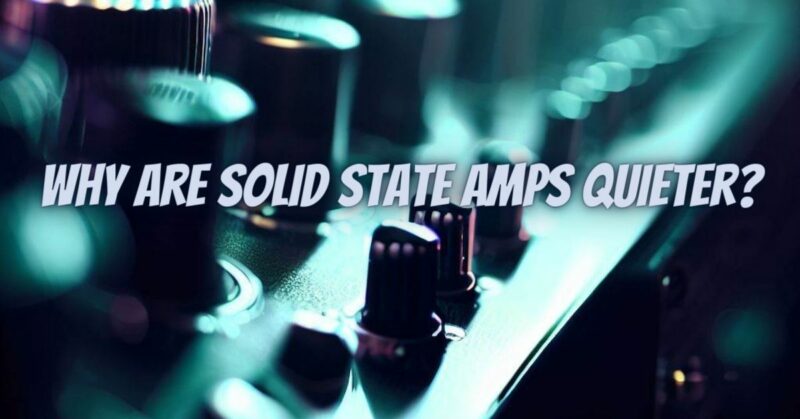Solid state amps are quieter than tube amps for a number of reasons:
- Transistors are quieter than tubes: Transistors are the main components in solid state amps, and they are inherently quieter than tubes. Transistors produce less noise and distortion than tubes, even when they are not being used to amplify a sound signal.
- Solid state amps are more linear: Solid state amps produce a more linear frequency response than tube amps. This means that they amplify all frequencies equally, regardless of the volume level. Tube amps, on the other hand, tend to amplify certain frequencies more than others at high volumes. This can result in a more distorted and noisy sound.
- Solid state amps are less susceptible to microphonics: Microphonics is a phenomenon that occurs when sound vibrations are transmitted to the components of an amp. This can cause the amp to produce unwanted noise. Tube amps are more susceptible to microphonics than solid state amps because tubes are more sensitive to vibrations.
- Solid state amps are less affected by environmental factors: Solid state amps are less affected by environmental factors, such as temperature and humidity, than tube amps. Tube amps can be more susceptible to noise and distortion in extreme environmental conditions.
In addition to these factors, solid state amps are often perceived as being quieter than tube amps because of the way they are used. Solid state amps are often played at higher volumes than tube amps because they produce a cleaner sound at higher volumes. However, when a tube amp is cranked up, it can produce a very loud and distorted sound.
Here are some additional things to consider when comparing the noise level of tube and solid state amps:
- The type of amp: Some solid state amps are designed to be quieter than others. For example, amps with clean circuits will be quieter than amps with high-gain circuits.
- The quality of the components: High-quality components will help to reduce noise and distortion in the amp.
- The way the amp is set up: The way the amp is set up can also affect the noise level. For example, setting the gain too high can increase the noise level.
- The environment: Solid state amps are less affected by environmental factors than tube amps. However, they can still be noisy in noisy environments.
- The speaker: The speaker that is used with the amp can also affect the noise level. For example, a larger speaker will be louder than a smaller speaker.
Ultimately, the perceived noise level of a solid state amp will vary depending on a number of factors. However, in general, solid state amps are perceived as being quieter than tube amps for the reasons listed above.
Additional considerations
In addition to the factors listed above, there are a few other things to keep in mind when considering why solid state amps are quieter:
- The human ear: The human ear is more sensitive to certain frequencies than others. The frequencies that solid state amps tend to amplify are less likely to be perceived as loudness.
- The way we perceive noise: Noise is a subjective experience, and it is influenced by a number of factors, including the type of sound, the context in which the sound is heard, and the individual’s personal preferences.
Overall, there are a number of reasons why solid state amps are quieter than tube amps. The combination of these factors can result in a solid state amp producing a sound that is perceived as being quieter than a tube amp, even when they are at the same volume level.


